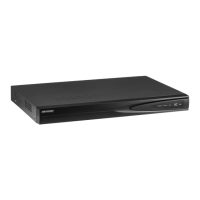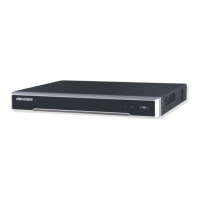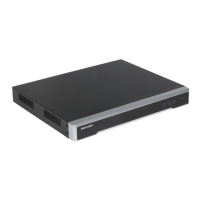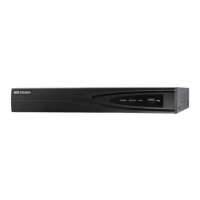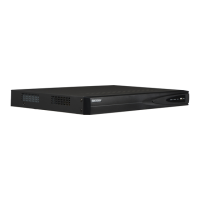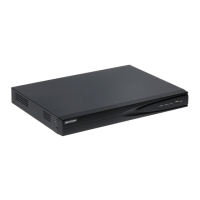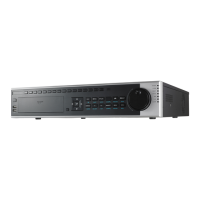Do you have a question about the HIKVISION DS-7616 and is the answer not in the manual?
Details FCC compliance requirements and conditions for digital devices operating in a commercial environment.
Outlines compliance with EU directives, WEEE, and battery directives for product disposal and recycling.
Explains the Class 1 laser safety classification for the optical disc drive according to international standards.
Details risks associated with hazardous voltage, grounding, power connections, and installation safety.
Provides cautions for safe installation and maintenance procedures, especially during electrical storms.
Covers power cord requirements, lithium battery precautions, and proper disposal of batteries.
Notes on perchlorate material handling, battery recycling, thermal injury, EMI, and lead content.
Introduces the DS-7600 Series Digital Video Recorder and its advanced H.264 technology.
Lists key features of the DS-7600 Series DVR, including compression, local monitoring, and HDD management.
Explains methods to navigate and operate the DVR using front panel controls, remote, mouse, or soft keyboard.
Details the buttons, indicators, and their functions on the DVR's front panel.
Provides procedures for powering the DVR on and off to ensure proper operation and longevity.
Instructions for restarting the DVR or locking the system, returning to Live View mode.
Guides through the initial setup process for the DVR, including user permission and general settings.
Explains icons and status indicators shown on the screen during Live View mode.
Describes how to operate functions like single camera view, multi-camera view, and manual switching.
Details mouse interactions for controlling Live View functions like switching views and PTZ control.
How to magnify specific areas of the live video feed by using the mouse.
Configuration settings for video output modes, display layouts, and dwell times.
Allows users to arrange the camera display sequence in selectable live view display modes.
Setup for recording parameters like stream type, resolution, bit rate, and video quality.
How to set up basic recording parameters for cameras after HDD initialization.
Setting up flexible recording schedules for daily or weekly recording based on time periods.
How to manually initiate recording for cameras at any time via the front panel.
Methods to prevent recorded files from being deleted or overwritten during cycle recording.
Steps to lock or unlock specific recorded video files using the video search function.
Configures an HDD to prevent new data from being written, protecting important files.
Advanced configurations for HDD management, including setting up HDD redundancy for data safety.
Configuring redundant recording by using multiple HDDs as a safeguard against disk failures.
Overview of playing back recorded video files, supporting multi-camera simultaneous playback.
Explanation of the toolbar and buttons on the playback interface for controlling video playback.
How to search and play back recorded files by selecting cameras, video type, and time range.
Searching and playing back recordings based on specific events like motion detection or alarms.
Playing back recorded video directly from the Live View screen using mouse or front panel controls.
Accessing and playing back video related to system log entries by searching logs.
Detailed playback control for viewing video frame by frame using mouse or front panel/remote.
How to zoom in on specific areas of the video feed during playback for detailed viewing.
Methods for backing up recorded video files to various devices like USB drives or DVD writers.
Detailed steps to export recorded files using Video Search or Event Search via USB.
Process for exporting specific video clips during playback status, up to 30 clips per channel.
Options for managing backup devices within the export menu, such as creating folders or formatting.
General section for setting up various alarm functionalities and detection methods.
How to configure motion detection, set detection areas, sensitivity, and trigger recording.
Configuring external relay alarm devices to trigger recordings upon alarm events.
How to manually trigger alarm outputs through the Manual Alarm menu.
Setting up detection and actions for video signal loss, including scheduling enablement.
Configuring detection and actions for video tampering, including setting detection areas and sensitivity.
Configuring alerts for irregular system events like HDD errors, network disconnection, or IP conflicts.
Explains various options for handling triggered exceptions, such as audio warnings or alarm outputs.
Initial network configuration for the DVR to enable monitoring over a network.
Basic network settings like IP address, subnet mask, gateway, and DHCP configuration.
Configuration for Point-to-Point Protocol over Ethernet access for network connectivity.
Setting up Dynamic DNS for remote access by providing a fixed domain name for a dynamic IP address.
Configuring Network Time Protocol server for accurate time synchronization across the DVR.
Setting up a remote host to receive alarm signals when an alarm is triggered by the DVR.
Setting up multicast for efficient video streaming over networks, overcoming limitation issues.
Changing default server (8000) and HTTP (80) port settings for remote client and browser access.
How to access and navigate the PTZ control menu using mouse or front panel/remote.
Initial setup for connected PTZ cameras, verifying PTZ and RS-485 connections.
Programming camera movements, positions (presets), sequences (patrols), and paths (patterns).
Explanation of PTZ control panel buttons like directional pad, zoom, focus, and iris.
Setting and calling specific camera preset locations by adjusting position and saving.
Programming patrol sequences for PTZ cameras by defining key points, duration, and speed.
Recording and playing back custom PTZ camera movements by setting paths.
Adding and configuring IP cameras connected to the DVR, including IP address and credentials.
Adjusting recording parameters like stream type, resolution, and frame rate specifically for IP cameras.
Setting up On Screen Display elements like time, date, and camera name for live view.
Masking sensitive or private areas within a camera's field of view to protect privacy.
Adjusting image properties like brightness, contrast, saturation, and hue for live and recorded images.
Overview of hard disk drive management functions, including initialization and status checking.
Steps to initialize new hard disk drives for use with the DVR, which erases all data.
Configuring network-attached storage (NAS/IP SAN) as network HDDs for the DVR.
Organizing HDDs into groups for assigning specific channels to record onto particular HDDs.
Changing HDD status to redundancy, read-only, or read/write (R/W) to manage behavior.
Protecting important files by preventing writes to an HDD when it becomes full.
Configuring redundant recording by using multiple HDDs as a safeguard against disk failures.
Viewing the operational status and SMART information of installed HDDs on the DVR.
Setting up alarms to trigger when an HDD is uninitialized or in an abnormal state.
General system configurations for the DVR, including language, output standards, and time zone.
Setting up basic system parameters like language, CVBS output standard, VGA resolution, and time zone.
Accessing and configuring more detailed system settings like device name, number, and operation timeout.
Configuring the RS-232 port for external device control using parameter control or transparent channel.
Adding, deleting, and modifying user accounts and permissions for DVR access.
Steps to create a new user profile with specific permissions for local and network settings.
Procedure for removing existing user accounts from the DVR.
How to edit existing user information, including username, password, level, and MAC address.
System-level management tasks for the DVR, including configuration import/export and firmware updates.
Transferring configuration files to or from the DVR via USB for efficient setup on multiple devices.
Methods for updating the DVR's firmware using a USB device or an FTP server.
Resetting the DVR to its original factory settings, excluding network information.
Displaying detailed information about the DVR's hardware and software configuration.
Accessing and searching the DVR's event and system logs for troubleshooting and monitoring.
Definitions of technical terms used throughout the manual, such as DVR, HDD, and PTZ.
Answers to frequently asked questions about DVR operation, troubleshooting, and compatibility.
A comprehensive list of compatible IP cameras for the DS-7600 NVR, detailing resolution and stream support.
| Video Input | 16 channels |
|---|---|
| Audio Input | 16 channels |
| Audio Output | 1 channel |
| Power Supply | 12V DC |
| Operating Humidity | 10% to 90% |
| Video Output | 1 HDMI, 1 VGA |
| Playback Resolution | 1080p |
| Video Compression | H.265+/H.265/H.264+/H.264 |
| Network Interface | 1 RJ45 10M/100M adaptive Ethernet interface |
| USB Interface | 2 USB 2.0 |
| Operating Temperature | -10°C to +55°C (14°F to 131°F) |
| Max HDD Capacity | 6 TB per HDD |

